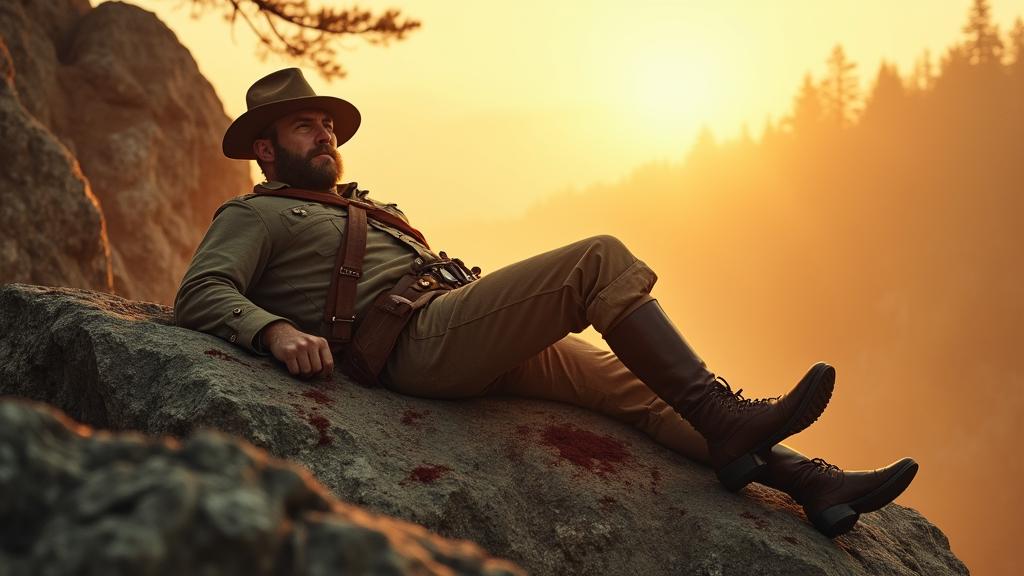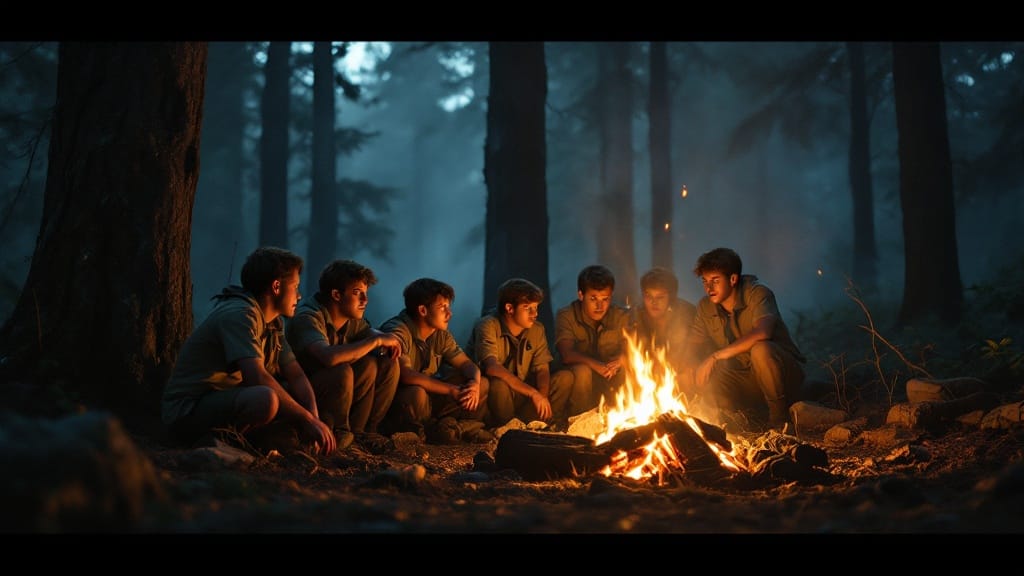Drama
The Union

Written by Heidi McDonald
Warning – This review contains spoilers.
The Union is set in a war-torn world, where a young soldier, scarred by endless battle, stumbles upon a pair of siblings who have managed to carve out a hidden refuge on a lonely mountain. Quint, a protective brother, strives to shield his sister, Frances, from the horrors of the ongoing civil war. Their fragile peace is disrupted when they encounter the wounded soldier, who they take in and nurse back to health. However, as the war creeps closer to their isolated haven, they are forced to confront the brutal reality that there’s no true escape from the conflict. What follows is a tense, emotional journey, where survival depends not just on physical strength but on the battles fought within.
What really stood out to me about The Union is the depth of the characters. The relationship between Quint and Frances is both tender and tragic, with Quint’s protective nature clashing against the inevitability of the war finding them. The wounded soldier adds an extra layer of complexity, bringing his own trauma and fractured humanity into the story. The dynamic between the three characters is well-developed, and their motivations feel authentic and consistent throughout the screenplay. Watching the characters try to hold on to a shred of normalcy in a world shattered by violence is compelling, and I can see audiences connecting with their struggles, especially during a table read where the tension between the characters can be felt more intimately.
While the story is strong, there are areas where the screenplay could use some tightening. Certain scenes feel overly long, and the pacing would benefit from some trimming or the addition of scene breaks. This is particularly noticeable in some of the more introspective moments, where the action slows down. While these moments are important for character development, their length can sometimes detract from the overall momentum of the story. With a few tweaks, especially in the pacing, the screenplay could maintain its emotional weight without losing the audience’s attention.
On a technical level, The Union has a few issues with formatting, particularly with scene headings and time of day indicators. These elements are spaced inconsistently, which can be distracting for readers. However, the dialogue and action descriptions are well-written, and there are no major grammatical or spelling errors. The use of flashbacks is effective, adding depth to the characters’ backstories and enhancing the emotional impact of their present struggles. The screenplay does an excellent job of showing, not telling, which makes the story visually engaging. Despite the formatting issues, the script’s storytelling remains solid and delivers a clear, emotionally charged narrative.
The Union offers a powerful exploration of survival, war, and the cost of protecting loved ones. The stakes are high, and the characters’ emotional journeys are what drive the story forward. This screenplay has the potential to make a strong impression on producers and audiences alike.
Comedy
Troop 458

WARNING! This review contains SPOILERS!
Troop 458, written by Trevor Allen, captures the often daunting, yet transformative, experience of being the new kid in a world full of unknowns. We follow Sidney, an anxious boy thrown into his first Boy Scouts campout, where he faces both the perils of acceptance and the strangeness of his eccentric scout leader. As spooky campfire tales start to weave into reality, Sidney is forced to confront his fears head-on, finding moments of humor, adventure, and unexpected camaraderie along the way.
I like the concept of Troop 458 because it blends coming-of-age themes with a playful sense of adventure, all wrapped in an atmosphere tinged with just the right amount of mystery. Allen’s writing brings to life a cast of memorable characters, especially through Sidney’s journey of growth. The tension between humor and fear feels authentic to the Boy Scouts’ setting, and it captures the real challenges kids face when trying to fit in.
What resonated with me most was the screenplay’s exploration of courage—not just in facing mythical dangers but in embracing who you are, quirks and all. Some aspects could benefit from a clearer focus on character motivations and tighter pacing to keep the momentum strong, particularly during scenes that blur the line between myth and reality.
The dialogue is great in many places, offering humor that feels natural for a group of young scouts. There were moments where I felt the conversations could be a bit sharper or more distinct to heighten the comedic or emotional impact. Character development is a strong suit, with Sidney’s evolution being both relatable and satisfying, but secondary characters could have a bit more depth to elevate the ensemble.
Allen’s Troop 458 is polished, with solid grammar, spelling, and formatting that adhere to professional standards. The structure is clean and makes for an easy read, setting up scenes that are visually compelling.
Troop 458 delivers an enjoyable mix of humor, heart, and a touch of the supernatural, leaving me eager to see how it might come to life on screen.
Drama
Ellie

WARNING! This review contains SPOILERS!
Directed by Marcus Mejia
Ellie is a refreshing experience that pulled me right into the world of a young, shy man navigating a work meeting while secretly yearning for a bit of magic in his everyday life. We’re taken through his imaginative, musical daydream—a beautiful escape from reality that reveals his true desires. I loved how the film peeled back layers of his personality without a single word of dialogue. Instead, the music carried the narrative, and surprisingly, it worked so well.
Marcus Mejia did an excellent job blending dramedy elements to keep the film engaging. The moments of humor and more emotional beats make the film feel well-rounded. Mejia’s choice to swap dialogue for music was a bold move, and it paid off. I could feel the character’s internal struggles and hopes as the music brought out emotions words couldn’t.
The lighting felt intimate, almost like it was giving us a window into the protagonist’s soul, and the cinematography perfectly captured the whimsical tone of his daydreams. I noticed how smoothly the editing transitioned between reality and fantasy, which made the story’s pacing feel just right. The sound design was on point, with every beat of music syncing beautifully with the character’s emotional highs and lows.
I loved when the protagonist’s daydream overlapped with reality, creating this seamless blend that felt so relatable. I admired how it portrayed the quiet, unspoken dreams we all carry. It was a reminder of the power of our inner worlds and how much magic lies just beneath the surface of our everyday lives.
Ellie left a gentle yet lasting impression. It’s a unique, heartfelt short film that shows how creative risks can pay off. Ellie is a memorable journey that’s definitely worth the watch.
Drama
Finding Acceptance

Directed by Andrew DeBennett
WARNING! This review contains spoilers.
Watching “Finding Acceptance” was an experience that brought me back to those anti-bullying films we’d see in school assemblies. The story follows Mary, a new student in a wheelchair, navigating the often-tough world of school friendships. Initially, she faces teasing from her peers but finds a genuine friend in Liz, who even manages to extend kindness to Mary’s bully, Max. The message is straightforward and clear: acceptance and empathy matter.
I could see what the director was aiming for—Andrew DeBennett notes that the film was both a joy to create and a personal project. The heart of the story shines through, with Kaylah Pollock (Mary) and Laney Hansen (Liz) bringing warmth to their roles. Their connection feels genuine, even if the overall story feels a bit too familiar.
Technically, the film could have used some fine-tuning. The sound mix was rough, with the music often drowning out dialogue. The editing also felt choppy, making it harder to stay immersed in the story. The dialogue leaned into clichés—phrases like “loser” felt outdated and took away from the realism. The cinematography, however, was a bright spot, creating a warm, inviting feel that suited the film’s positive message.
I felt like the story could’ve benefited from more depth. The bullying that Mary faces is minimal, making her eventual friendships feel somewhat predictable. For younger audiences, this simplicity might be engaging and easy to digest, but it misses the chance to delve into the more complex aspects of acceptance.
In the end, “Finding Acceptance” delivers a positive, albeit simple, message. While it didn’t connect with me on a deeper level, I can see it being a useful film for educational settings, especially for younger viewers learning about kindness and friendship.










